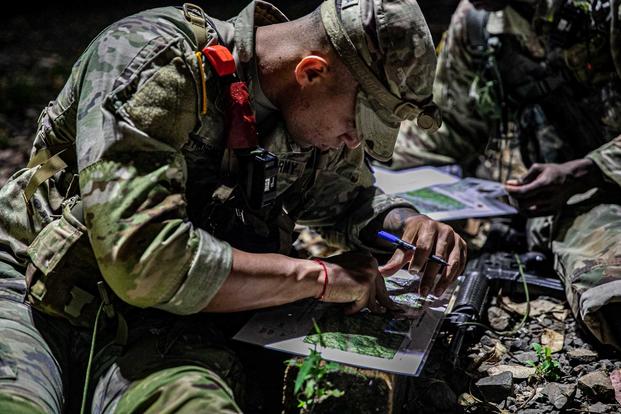Land navigation is making a comeback as part of the Army's Basic Leader Course, or BLC, with a pilot program starting in the coming months and full return to active-duty schools planned for next year.
"Oh, it's coming. Soldiers need to know how to read a map," Sergeant Major of the Army Michael Grinston told Military.com.
BLC is a 22-day school for the Army's junior leaders and required to rise to the rank of sergeant. It mostly teaches soldiers about the service's policies, including sexual assault prevention, noncommissioned officers' legal authorities and how to submit soldiers for awards.
Land navigation was removed in 2018 to make room for more classroom instruction, with the idea being that the soldier's unit should be validating basic combat skills. While units will still train land navigation on their own, Army leaders hope that having it once again count as a graded event at a must-pass school will put a greater emphasis on navigation training. It's unclear what will be removed or scaled down from the curriculum.
"There was a significant shift from training to education; this is putting a premium back on a skill that's needed in various environments, including [those in] which GPS devices are jammed and soldiers have to rely on a compass to get around," Command Sgt. Maj. Jason Schmidt, the commandant of the NCO Leadership Center of Excellence and the Sergeants Major Academy, told Military.com.
The force in recent years has put a greater emphasis on combat tasks as it reorientates from the post-9/11 wars to conventional warfighting. Gen. David Thompson, Space Force's space operations vice chief, told NBC News last week that Russians are jamming GPS satellites in Ukraine -- something that can make the electronic navigation devices troops became accustomed to in Iraq and Afghanistan useless.
Schmidt said he hopes to get a pilot program, which will include day and nighttime land navigation, into at least four BLC schools by the end of the summer. Those schools are at Fort Bliss, Texas; Fort Drum, New York; Fort Stewart, Georgia; and one of the Army's training areas in Hawaii. There also might be a trial at one of the National Guard's schools, but those details haven't been finalized.
After that trial, Schmidt aims to fully implement land navigation into all 33 BLC schools next year. But it may take longer for the Reserve and National Guard courses to get the new curriculum.
Land navigation is a staple for virtually all of the Army's elite schools, such as Ranger and Special Forces Assessment and Selection, as well as qualifications for prestigious awards such as the expert soldier, infantry and medic badges -- and is one of the common reasons for a soldier to fail those tests.
Even without the threat of a future adversary jamming GPS signals, navigation errors have proven fatal.
The 507th Maintenance Company was part of the rapid advancement toward Baghdad during the invasion of Iraq in 2003 and was last in a column of 600 vehicles.
Over the course of roughly three days, the unit slowly became separated from the main force after encountering troubles with its heavy vehicles maneuvering on top of soft sand and numerous breakdowns on the cross-country route through Iraq's blistering heat.
With little rest after days of driving, fatigue set in, leading to a single navigation error of missing a turn in the complex urban jungle of the Iraq town An Nasiriyah, according to a Defense Department report of the ensuing ambush.
Of the 33 soldiers in the convoy, 11 were killed during fierce attacks from Iraqi troops and insurgents; seven were captured, including Pfc. Jessica Lynch.
"This isn't a combat-arms task; it's important for all [soldiers] to understand it," Schmidt said. "When you look at what the future battlefields may hold, there may not be [forward operating bases] and walls protecting them. Everyone might need to navigate. It's a skill all individual soldiers should have a baseline understanding of."
-- Steve Beynon can be reached at Steve.Beynon@military.com. Follow him on Twitter @StevenBeynon.
Related: The First Shots in a Ukraine Conflict May Be in Space













